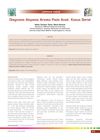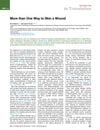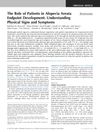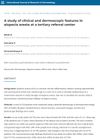 April 2024 in “DAHUDER Medical journal”
April 2024 in “DAHUDER Medical journal” The study concluded that there is no significant link between thyroid autoimmunity and alopecia areata.
 February 2024 in “Curēus”
February 2024 in “Curēus” A balanced diet with proteins, vitamins, and minerals is crucial for managing skin disorders.
 July 2023 in “Health science reports”
July 2023 in “Health science reports” Alopecia Areata is linked to a higher risk of several diseases, which vary with age and sex.
 October 2022 in “Portuguese journal of dermatology and venereology”
October 2022 in “Portuguese journal of dermatology and venereology” The best concentration of triamcinolone acetonide for treating alopecia areata is still unclear.
May 2017 in “The journal of investigative dermatology/Journal of investigative dermatology” Topical immunotherapy for alopecia areata may work by creating immune cell clusters in the skin.

The document concludes that hair loss in women can be caused by various factors and is managed with specific treatments like medication, therapy, and lifestyle changes.
 53 citations,
January 2014 in “Journal of Cutaneous and Aesthetic Surgery”
53 citations,
January 2014 in “Journal of Cutaneous and Aesthetic Surgery” Microneedling combined with triamcinolone can safely stimulate faster hair regrowth in people with Alopecia Areata.
17 citations,
January 2019 in “Journal of cutaneous medicine and surgery” JAK inhibitors show promise for treating hair loss in alopecia areata but need more clinical trials to confirm safety and effectiveness.
 1 citations,
June 2023 in “Genes”
1 citations,
June 2023 in “Genes” Hair loss from Alopecia Areata is caused by both genes and environment, with several treatments available but challenges in cost and relapse remain.
 September 2023 in “Drugs in context”
September 2023 in “Drugs in context” Baricitinib is a promising treatment for alopecia areata.
 January 2023 in “Rossijskij žurnal kožnyh i veneričeskih boleznej”
January 2023 in “Rossijskij žurnal kožnyh i veneričeskih boleznej” New treatments for child hair loss due to immune issues are effective but not yet officially approved.
 April 2022 in “Cermin Dunia Kedokteran”
April 2022 in “Cermin Dunia Kedokteran” Accurate diagnosis and understanding of alopecia areata in children are crucial for proper treatment.
 33 citations,
June 2012 in “Journal of Crohn's and colitis”
33 citations,
June 2012 in “Journal of Crohn's and colitis” Alopecia Areata might be linked to Crohn's disease.
 2 citations,
November 2018 in “Cell Stem Cell”
2 citations,
November 2018 in “Cell Stem Cell” The research found a new way to heal chronic skin ulcers by turning certain cells into skin tissue using specific factors.
 November 2024 in “Journal of the European Academy of Dermatology and Venereology”
November 2024 in “Journal of the European Academy of Dermatology and Venereology” More effective treatments are needed for alopecia areata, hidradenitis suppurativa, and vitiligo.
 48 citations,
May 1999 in “International Journal of Dermatology”
48 citations,
May 1999 in “International Journal of Dermatology” Alopecia areata is an unpredictable autoimmune hair loss condition, treated based on severity, with half of patients regrowing hair within a year without treatment.
 35 citations,
January 2002 in “Dermatology”
35 citations,
January 2002 in “Dermatology” A woman's hair loss during treatment with specific hepatitis C drugs grew back after stopping the medication.
 January 2023 in “Indian Dermatology Online Journal”
January 2023 in “Indian Dermatology Online Journal” No single ideal JAK inhibitor for alopecia areata has been determined; JAK3 inhibitors may be promising with fewer side effects.
 16 citations,
April 2007 in “Journal of Medical Primatology”
16 citations,
April 2007 in “Journal of Medical Primatology” The monkey's hair loss was due to an autoimmune disease, not genetics.
 3 citations,
October 2020 in “Journal of Investigative Dermatology Symposium Proceedings”
3 citations,
October 2020 in “Journal of Investigative Dermatology Symposium Proceedings” The main goal for new Alopecia Areata treatments should be significant improvement in scalp hair growth.
 1 citations,
October 2020 in “International Journal of Research in Dermatology”
1 citations,
October 2020 in “International Journal of Research in Dermatology” The study concluded that short vellus hair and yellow dots were the most common signs of alopecia areata, indicating disease activity and remission.
 January 2016 in “Journal of The Korean Medical Association”
January 2016 in “Journal of The Korean Medical Association” The document says how to diagnose and treat hair loss from alopecia areata, but there's no cure and treatments vary.
69 citations,
May 2009 in “Journal of Investigative Dermatology” Stress might contribute to hair loss in alopecia areata.
 24 citations,
June 2016 in “Acta dermato-venereologica”
24 citations,
June 2016 in “Acta dermato-venereologica” Tofacitinib helped a young woman's severe hair loss and arthritis but not her plaque psoriasis.
21 citations,
December 2017 in “The journal of investigative dermatology. Symposium proceedings/The Journal of investigative dermatology symposium proceedings” Simvastatin/ezetimibe may help treat new cases of alopecia areata but not long-term cases.
19 citations,
August 2019 in “Dermatologic therapy” Janus kinase inhibitors show promise for treating alopecia areata but need more research for confirmation.
 4 citations,
October 2013 in “Clinics in Dermatology”
4 citations,
October 2013 in “Clinics in Dermatology” Experts don't fully agree on how to diagnose certain hair growth disorders and more research is needed to understand them better.
 2 citations,
January 2019
2 citations,
January 2019 The document concludes that autoimmune skin disorders are treated with corticosteroids and immunosuppressive drugs.
 October 2024 in “Journal of Education Health and Sport”
October 2024 in “Journal of Education Health and Sport” Alopecia areata treatment should be personalized, using topical or systemic therapies based on severity, with promising options like JAK inhibitors needing more research.
 June 2023 in “British Journal of Dermatology”
June 2023 in “British Journal of Dermatology” Baricitinib was effective and safe for severe hair loss treatment over 6 months.

























